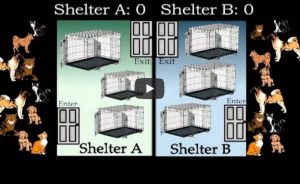Module 6: The Case of the Overwhelmed Shelter
Length of Stay
Let’s explore in detail another important number for animal shelters to track: length of stay (LOS). LOS is the duration of an animal’s time in the shelter from day of admission to day of disposition. These days are referred to as “animal care days”. This statistic has a big impact on whether a shelter is within or beyond capacity for care.
It seems logical that if you give an animal a few more days in the safety of a shelter that it would increase the chances for that animal to exit the shelter alive. Wouldn’t a few more days give the animal a better chance of being found by a lost owner, to find a new home, or to go to a rescue placement?
LOS can have a dramatic effect on the daily shelter population and the capacity for care. The table below is a simple example to show how daily population (animal census or inventory) increases as LOS increases even when the number of animals admitted each day remains constant.
Daily census = number of animals admitted/day X LOS
| Daily animal intake | Length of stay | Daily population (census) |
| 5 animals | 5 days | 25 animals |
| 5 animals | 10 days | 50 animals |
| 5 animals | 20 days | 100 animals |
Reducing the number of animal care days (LOS) per animal can dramatically reduce the potential for crowding and disease and improve the level of care available for each animal without increasing euthanasia or reducing live release. In fact, reduced crowding and illness through increased speed of flow-through can lead to increased numbers of lives saved.
Watch This
Watch this shelter flow simulation that demonstrates the effect that LOS can have on a shelter population. [5:51 min]
As the daily population rises and exceeds shelter capacity for care, there is a concomitant increase in the risk for infectious disease, stress, and behavioral deterioration. Reducing the number of animal care days (LOS) per animal can dramatically reduce crowding and improve the level of care available for each animal.
Watch This
Test Your Knowledge



